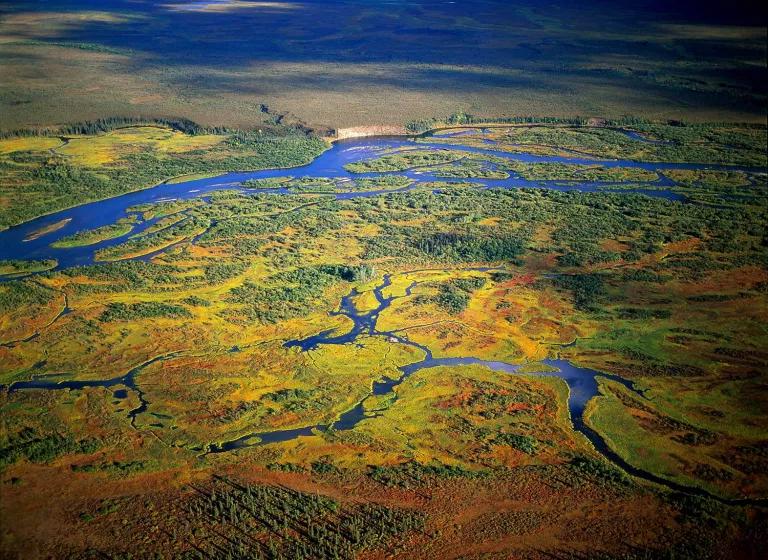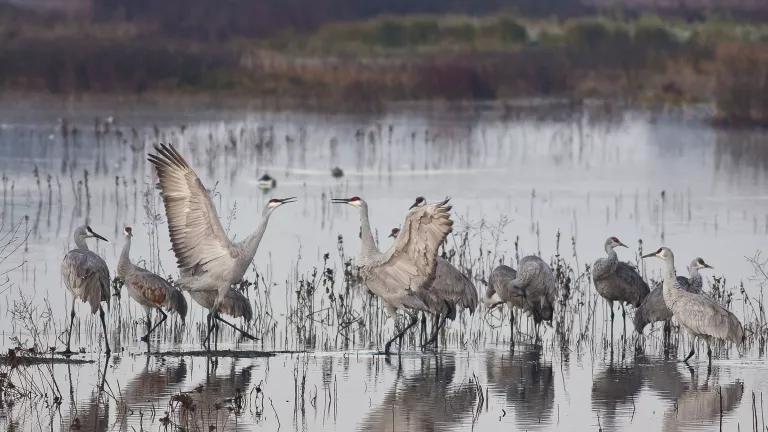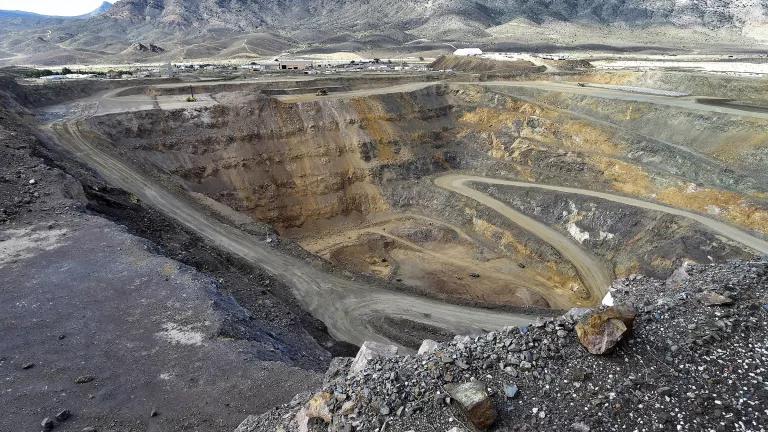The Case Against the Pebble Mine—“Not Now, Not Ever”

When I’m asked why NRDC is so determined to stop the Pebble Mine, I mention that Pebble is a massive open pit gold and copper mine proposed by an underfunded Canadian owner—Northern Dynasty Minerals—for construction in the headwaters of Bristol Bay, Alaska, home to the greatest wild salmon ecosystem on Earth.
I explain that it is one of the most reckless, widely-opposed development projects anywhere in the world today—an environmental, social, and economic pariah on a global scale, and a bad long-term investment.
And here’s why:
Consider this extraordinary history of condemnation by diverse stakeholders around the world, each of whom has said, in one way or another, “not now, not ever” to the Pebble Mine. For example, Pebble has been:
- opposed for decades by 80 percent of the residents in Alaska’s Bristol Bay region where it would be built;
- described in 2014 by the U.S. Environmental Protection Agency, after years of peer-reviewed scientific study, as potentially “catastrophic” in its environmental impacts;
- dismissed “as the wrong mine in the wrong place” by a consensus of former EPA Administrators from every Republican President (except Ford) since EPA was created—Nixon, Reagan, George H. W. Bush, and George W. Bush.
- abandoned by four of the world’s leading mining companies—Mitsubishi Corporation (2011), Anglo American (2013), Rio Tinto (2014), and, just last May, First Quantum Minerals (2018);
- denounced in 2016 by the IUCN World Conservation Congress, which voted virtually unanimously to oppose the Pebble Mine and urge the United States government to deny permits;
- opposed by 60 jewelry companies around the world, led by Tiffany & Co., which has concluded that it poses a “dire threat to the remarkable Bristol Bay ecosystem, and the world’s most productive salmon fishery it sustains,” and, last year, that “there are certain places where mining should simply never occur. Alaska’s Bristol Bay is one such place;
- rejected in early 2017 as a “value-destroying boondoggle” by New York-based investment firm Kerrisdale Capital, which, based on a thorough financial analysis, concluded that the “Pebble project is doomed: politically impaired and commercially futile”;
- condemned in 2013 and 2018 by trustees for several of the largest pension funds in the country—CalPERS, CalSTRS, NYPERS, and NYCERS; and
- repudiated by a 65% majority of Alaskan voters in a 2014 statewide initiative that protects the region’s salmon from destructive projects like Pebble.

There is no dispute that Pebble’s open pit would be gouged from the pristine tundra at the top of the watershed that feeds the most productive wild salmon fishery on the planet. The Bristol Bay fishery has generated every year between 30 million and 60 million salmon annually. Last summer alone, the fishery produced a record of 62 million wild salmon, and every year it generates revenue of $1.5 billion and jobs for 14,000 people. It is the “Fort Knox” of salmon on Earth—the source of 50 percent of the world’s sockeye salmon—and the sustainable economic engine of southwest Alaska, fueled by both commercial fishing and recreation.
It sustains the people, communities, and wildlife of Bristol Bay that have subsisted on its natural bounty for millennia. Indeed, the Alaska Native tribes and communities of Bristol Bay overwhelmingly oppose the Pebble Mine. Stakeholders in the multi-billion-dollar Bristol Bay commercial fishing industry are virtually unanimous in their opposition, as are the thousands of sport-fishers from all over the world who frequent the region.
Against this formidable wall of opposition, the small Vancouver-based exploration company Northern Dynasty Minerals remains today the 100 percent owner of the project. Created by Hunter Dickinson Inc. to develop the Pebble prospect, Northern Dynasty has no other assets, no mining partners, and only minimal funding, which, according to its most recent quarterly report, is expected to drop to about $12,681,000 cash on hand by the end of 2018. The company is desperate to secure either a major mining company partner or significant financial investment, not just to sustain the Pebble project but to continue as a going concern. For Northern Dynasty, the future is literally “Pebble or bust.”

Last year, Northern Dynasty was thrown a life-line by the Trump Administration. In May 2017, after a one-hour, closed-door meeting with the mining company’s CEO, then-EPA Administrator Scott Pruitt agreed to abandon restrictions that EPA, based on an extensive, twice-peer reviewed scientific risk assessment, was poised to impose under the federal Clean Water Act.
With this political turn of events, Northern Dynasty was able to attract another Canadian company as a major investor and potential partner, only to see this company, too, abandon the project and its investment six months later. Nevertheless, this brief infusion of cash enabled Pebble to file a federal permit application with the US Army Corps of Engineers that, when approved, will allow, among other devastation, thousands of acres of pristine wetlands in the Bristol Bay headwaters to be destroyed for Pebble’s massive open pit, to say nothing of the mine’s associated infrastructure. That permitting process is ongoing.
The fate of the Pebble Mine at the headwaters of the 40,000-square mile Bristol Bay watershed may be the most consequential land use decision in North America today, pitting an essentially eternal supply of food against an essentially eternal supply of poison. Objectively, it’s a bad social, environmental, and financial investment. It is absolutely “the wrong mine in the wrong place,” a reckless threat to an incomparable salmon ecosystem deemed “a national treasure” by the Obama Administration. And it must be stopped.
Take action now.




